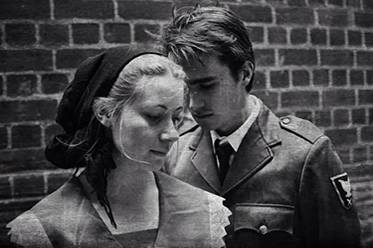 Gabriel Bergmoser’s new script, A Good German uses “one of the darkest periods in our history” to explore the lines we all draw around our own idea of ethics (or morality, as the show’s program notes).
Gabriel Bergmoser’s new script, A Good German uses “one of the darkest periods in our history” to explore the lines we all draw around our own idea of ethics (or morality, as the show’s program notes).
The show was billed as the protagonist, Furst’s (played by Bergmoser) moral dilemna, after falling in love with a Jewish woman interred in the concentration camp at which he works. In reality, this is an ensemble script, with each of the characters facing their own struggle with ethics, compromise and what it is to be a good German.
Set in the old dock at Revolt Artspace, the audience sits as though imprisoned in the camp, looking up at the Kommandant Eichel’s office and Deitrich, the good doctor’s apartment. This is a simple and effective piece of staging that adds immediate atmosphere and tension.
This is short script (the show runs for a little over an hour) across four settings, with a number of scene changes. Directors Justin Anderson and Ahsley Tardy have created a set of four settings, which address this challenge beautifully, it is an appealing and intriguing sight on entry to the space. A few overly long blackouts between scenes, due to technical difficulties on the night, did interrupt what momentum was gathered during the short scenes, but this is likely to be less jarring when the scene changes become smoother.
On the whole, the script tells an interesting story, with engaging characters. That each of them has their own struggle is appropriate to the theme of the piece. There are a few expositions in the script that lean towards preaching. With some solid dramaturgy, this script has the potential to be wholly interesting and engaging.
Generally, the cast performed well. Some of the accents were patchy, particularly during times of heightened emotion. The show could have been performed just as well in native accent, which may have been less jarring. A greater issue for most members of the cast was a lack of connection with each other.
Too frequently, we saw people in conversation become two characters reciting their lines. Perhaps this is due to the difficulty of maintaining an accent as well as a character. The exception was Christopher Farrell as Eichel, whose accent and intent were clear throughout the piece. While some of his mannerisms were a little off character, it was clear that this was not a cardboard cut-out ‘baddie’, but a man doing what he thought was necessary for his country.
As the Jewish patriarch Jakob, Bevan Uren had some great moments in his performance, particularly at the beginning of his interaction with Eichel. This scene encapsulates the play’s struggle with what it is to be the titular good German – a conversation between two men, one Nazi, one Jewish, both considering themselves German above all else, from opposite sides of the conflict. As the scene progressed, I wanted to see some more interaction between the characters, which made Uren’s tendency to deliver all of his lines forward a little frustrating.
The staging, set and props were all thoughtfully designed and executed. Costumes for the two soldiers and the doctor were accurate and convincing. The costumes for the Jewish characters were a little too neat and tidy for camp inmates, who would have had all clothes and possessions confiscated on arrival.
Overall, this was a solid piece of theatre that could have been really good with only small tweaks in each area. Some solid dramaturgy could have produced a finished script. A little more commitment would have made the performances engaging. A few tweaks to direction would have removed the jarring pauses between scenes.
Bitten By Productions are not afraid to explore difficult themes. In fact, I get the feeling that they relish it. I am interested to see what the team comes up with next.
A Good German
Revolt Artspace, 12 Elizabeth Street, Kensington
Season: 21 – 25 October 2014
Information: www.facebook.com/BittenByProductions
Image: courtesy of Bitten By Productions
Review: Jennifer Piper
